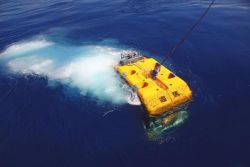Difference between revisions of "Haima"
imported>Ciic (Created page with 'thumb|250px|Haima, China's first home-grown unmanned submersible '''Haima''' ('''海马号'''), or sea horse, is China's first home-grown unmanned submersib...') |
imported>Ciic |
||
| Line 1: | Line 1: | ||
[[file: Haima.JPEG|thumb|250px|Haima, China's first home-grown unmanned submersible]] | [[file: Haima.JPEG|thumb|250px|Haima, China's first home-grown unmanned submersible]] | ||
| − | '''Haima''' ('''海马号'''), or | + | '''Haima''' ('''海马号'''), or “Sea Horse,” is China's first home-grown unmanned submersible which can dive down to a depth of 4,500 meters via remote control. The vehicle marks yet another step in China's drive to explore deep sea resources. |
| − | It took six years for Chinese scientists to develop core | + | It took six years for Chinese scientists to develop the core technology required for creating the machine. The submersible has undergone multiple improvements following several problems and malfunctions during testing in laboratory tanks and the ocean. |
| − | During tests, the vehicle achieved a maximum depth of 4,502 meters, and | + | During the tests, the vehicle achieved a maximum depth of 4,502 meters, and managed to reach the central basin in the South China Sea for tasks such as deploying cables, collecting sedimentary rock samples and photography. |
| − | Meanwhile, Qianlong-1, another unmanned submersible still in the trial stage, is designed to travel to a depth of 6,000 meters and will be tasked with exploring the seabed and collecting hydrological data. | + | Meanwhile, Qianlong-1, another unmanned submersible still in the trial stage, is designed to travel to a depth of 6,000 meters and will be tasked with exploring the seabed and collecting hydrological data. |
| − | In 2012, Jiaolong, the country's most advanced manned submersible, achieved a record | + | In 2012, Jiaolong, the country's most advanced and manned submersible, achieved a record diving depth of more than 7,000 meters in the Pacific Ocean's Mariana Trench. |
[[category: Science and technology]] [[category: Deep sea research]] | [[category: Science and technology]] [[category: Deep sea research]] | ||
Latest revision as of 07:28, 25 April 2014
Haima (海马号), or “Sea Horse,” is China's first home-grown unmanned submersible which can dive down to a depth of 4,500 meters via remote control. The vehicle marks yet another step in China's drive to explore deep sea resources.
It took six years for Chinese scientists to develop the core technology required for creating the machine. The submersible has undergone multiple improvements following several problems and malfunctions during testing in laboratory tanks and the ocean.
During the tests, the vehicle achieved a maximum depth of 4,502 meters, and managed to reach the central basin in the South China Sea for tasks such as deploying cables, collecting sedimentary rock samples and photography.
Meanwhile, Qianlong-1, another unmanned submersible still in the trial stage, is designed to travel to a depth of 6,000 meters and will be tasked with exploring the seabed and collecting hydrological data.
In 2012, Jiaolong, the country's most advanced and manned submersible, achieved a record diving depth of more than 7,000 meters in the Pacific Ocean's Mariana Trench.
